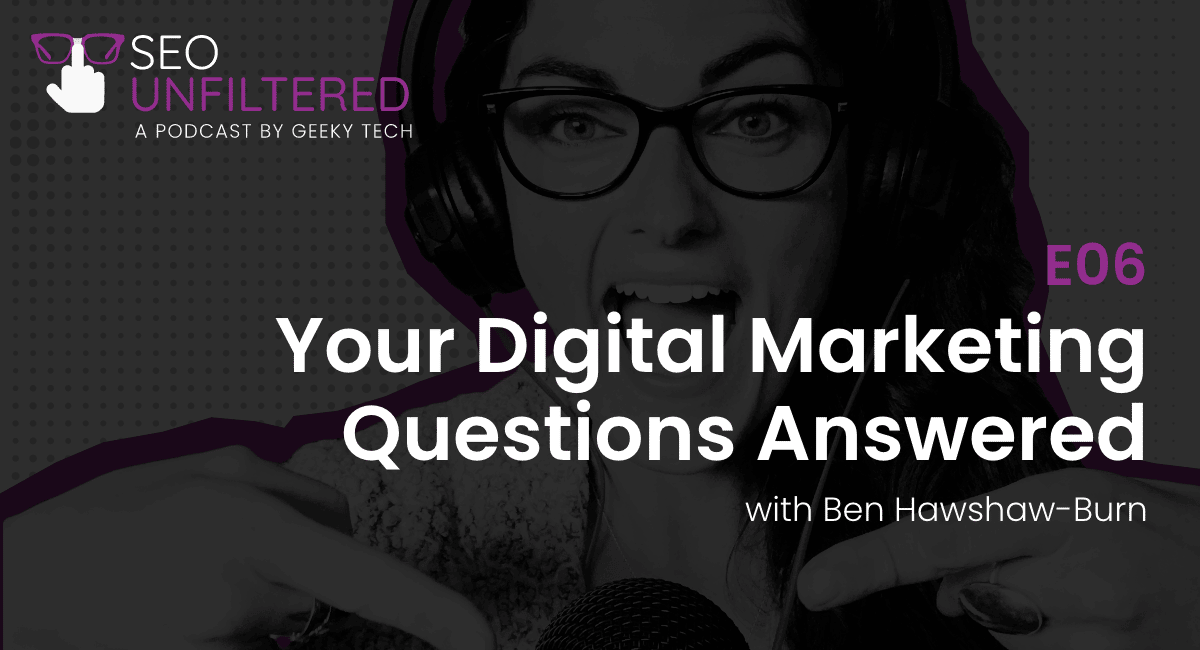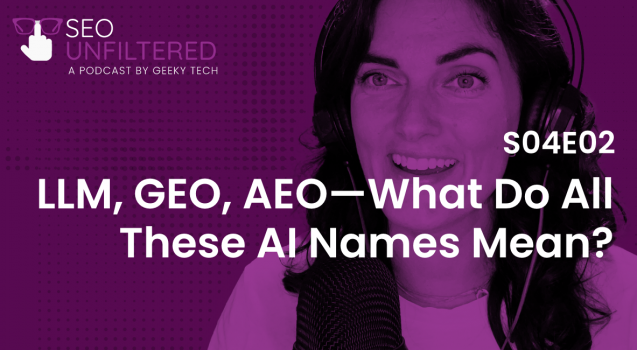Transcript
Can you believe that when this original episode aired, ChatGPT had just been released to the public? Let’s think about this for a second. When we aired our 5 Bad Habits episode, it was March 2023 and since then pretty much everything about digital marketing has changed. And we’re not talking about those cute little Google updates. We’re talking about the very nature of organic search engine optimisation, we’re talking about adapting our marketing practices to make room for and take advantage of the way people search the web now. Because even though Google is still the Mac Daddy of search, ChatGPT and others like it are being used en masse by people all over the world, including your customers.
The world is a different place since we last talked about bad marketing habits, and I mean that in every sense. But since this podcast is about SEO and GEO, we’ll leave the dire state of the planet to the experts and focus on what we know best.
To refresh your memory, back in 2023 the worst marketing habits out there were putting off writing content, not setting up your GA4 (well if you haven’t done that by now then I don’t know how you’re surviving at the moment), avoiding change like AI and automation, not having a company style guide, and not setting up your tagging correctly.
And we’re doing it again!
So out of those five bad habits, avoiding change is still a big one, so why don’t we pick up that thread with a new perspective, because we are in fact living inside the tornado that is the AI revolution, so we might as well look at your resistance to the storm first.
#1) Resisting Change
Change is a harsh fact of life, which just goes to show that this podcast is about more than just marketing advice. As the Taoists say, resistance to change is the source of suffering, and that it’s better to yield to it and embrace the natural flow of things like a river or a leaf on the wind.
As I said, we’re mid-AI revolution, so of course there’s going to be some resistance or pushback to embracing new digital technologies. Especially because, let’s face it, AI is kind of a threat to some people. And I, a humble content writer, am not going to sit here and tell you to embrace AI with your flood gates wide open. What I’m saying is that while you’re holding on to those manual marketing tasks, your competitors are whizzing past you at this very moment because they’ve streamlined their tech stack and integrated technology in a way that makes them faster, more accurate, and more responsive to customer needs.
And that’s just embracing the tech that powers your digital marketing. What about embracing the changing nature of your SEO? At Geeky Tech, we’ve been investing quite a lot of time in helping our clients foster a more AI-driven approach to organic search. The industry doesn’t quite know what to call it yet, but we’ve been using GEO (or generative engine optimisation) and LLMO (as in large language model optimisation) interchangeably until someone makes up their mind.
This really should be its own bad habit, but we’ll just squeeze it in here cuz it fits so nicely. Not embracing change means you’re probably at this very moment hemming and hawing over the prospect of adapting your existing SEO practices, but trust me, not taking the simple steps to boost your content for generative search tools is going to bite you in the bum one day, and if you don’t believe me consider the fact that right now AI engines are either talking about you, not talking about you, or misrepresenting and by extension hurting your brand whether you like it or not, so embracing change means taking back control of the narrative so you don’t have to focus on repairing the damage later on when you finally come to your senses.
And on that fear-mongering note, let’s move on to number two, which I have worded as…
#2) Not Having a Good Relationship With Data
Because I really want to emphasise the overall misuse of data, not just neglecting to set up Google Tag Manager or Search Console. You can be completely locked into all these analytics tools and still have a poopy relationship with data if what you’re tracking doesn’t really make much sense or give you the insights you need to improve your campaigns, cut out waste, or jump on opportunities you didn’t even know were there, and make your competitors quiver in fear.
So, how do you make your data more accessible, relevant, and accurate?
Not to sound like an infomercial, but start by clarifying in your own mind, in your own boardroom, what it is that’s important to you. Are you after more conversions, more sales, more sign-ups? Nail those KPIs because when you do, you’ll suddenly become quite clear on what metrics you should be tracking.
Next, decide where your data is going. Now I’m not a data guy, but I do know that data can not only come from a million different places, but it can also sit in a million different systems, which may not only be violating some data privacy and governance regulations, but it also makes it a bit tricky to get the full picture without some kind of integration and consolidation. So prioritize that.
Then, you want to take your data and make it super accessible to the people who actually need it, which means you should be using those AI-powered analytics tools to make that data easy to find and understand.
And what’s great about AI-powered analytics tools is that they can do the data sifting, trend-forecasting, activity monitoring for you, which means you’ll have ample time to stop doing bad habit number three which is…
#3) Overlooking Your Marketing Strategy
I touched upon this briefly when I mentioned that you need to know what your goals are for your data and analytics to mean anything to you. But strategy in more specific terms refers to the foundational steps needed for successful SEO and GEO to occur. Or since we’re talking about bad habits, what I mean to say is not having a logical, fleshed out strategy.
At Geeky Tech, I’m just a content writer so my direct exposure to clients is limited, but I’ve been in this business long enough to know that there are plenty of marketers out there who treat SEO like a very expensive guessing game. Or, equally, they work backwards from what their product or service is and build content around their offering without really taking the customer’s needs, wants, and pain points into consideration, like at all.
I doubt your marketing department has a fuck-around-and-find-out kind of budget or patience, so your strategy arguably needs to be more aligned with who you’re targeting. And especially considering GEO is all about understanding user intent, it just makes sense to take a more customer-centric approach. What you get is content that’s more relevant and engaging, which as we know, leads to more conversions and better long-term ROI.
But your strategy isn’t just about creating irresistible come-hither content that makes your customers drool. It’s also about keeping your competitors in line of sight. After all, that’s why the hare lost to the tortoise. He wasn’t paying attention to the slow and steady tortoise coming up behind him and before he knew it, the tortoise won the race. SEO doesn’t work in a vacuum, which is a bit obvious because everyone’s fighting for the page one spot.
If you’ve got your target persona and you got your product, you’re obviously almost there, but developing a data-backed strategy will help your business improve your visibility on both search engines and AI engines, and attract highly qualified traffic to your site with content that meets the customer wherever they are on their buyer journey. And it does all this with minimal waste to your time and budget.
And speaking of strategy, did you know that Geeky Tech actually offers SEO and GEO Strategy as a standalone service? That’s right. Geeky Tech’s strategy includes all aspects of your online visibility like competitor analysis, market analysis, keyword strategy, content calendar creation, and backlink strategy—you know I think we’ve been doing this podcast for three or four years now and I believe this is the first time I’ve done a Geeky Tech plug. But that just shows how much I believe in the product. It really works. Now on with the show.
#4) Not Having Consistent Branding
To be fair, this is actually quite close to the original episode’s bad habit of not having and using a company style guide.
So to reiterate, inconsistent branding or inconsistent messaging confuses people, and we do not want to confuse people. You want to be as clear, consistent and unflappable as a military parade, where every officer is wearing the same colours, the same style of boots—you won’t find a single missing button or pin out of place. Everything is uniform. That’s what your branding should be emulating.
I know we’ve been conditioned to think this way over the centuries, but would we take an army seriously if it was disorganised, or if its soldiers didn’t know how to march, or if they couldn’t agree on which fatigues they should be wearing?
And of course, all this inconsistency is highly unprofessional and makes a company seem unreliable. And it’s not just colours or fonts. It’s also tone of voice, it’s also brand personality. It’s also customer service. And guess what, people notice brand inconsistencies very easily.
What happens when your branding isn’t consistent?. You undermine your messaging, your public image becomes weakened, and your credibility becomes shot. But more than that, it’ll cost you money to fix all these inconsistencies, root out where the incorrect information is coming from, and rebuild your brand identity, so why not take the proactive route and build your brand like you would your army. I guess I could have also used a sports team as the analogy. It might have sounded less war-mongery, but you get the picture.
Let’s move on to number five and I’ve saved the best for last because it’s the source of so much schadenfreude and not to mention a healthy dollop of frustration, number five is…
#5) Giving AI Full Control of Your Content
Okay. Am I a little biased? Of course.
But am I also a human being with eyes and a brain? Yes, I am.
And am I also an internet-savvy adult who’s learned to detect AI-written content? Also guilty.
And when I’m trying to research something, am I satisfied with just top-level information that I could have found on ChatGPT anyway? What do you think?
At this point, I’m not saying don’t use AI to write your content. Everyone does it and Google doesn’t care who writes it as long as it serves the people and isn’t spitting out obvious nonsense.
But what happens when you don’t oversee your AI-written pages before publishing them? It becomes super obvious that you didn’t write them. Generative AI has been going strong for like two years now, and in that time, it still hasn’t managed, thank god, to write better than the experts. Don’t get me wrong, it knows how to write, but it has its tell-tale patterns, shortcomings, and limitations that often make it obvious when it hasn’t been supervised by a person.
Why is this bad for your brand? First of all, AI content does not have the depth of knowledge that an expert does. It has, of course, been trained on reams of data and information, but that doesn’t mean it’s actually done the work or had the experience of a real person, so of course, it’s not going to offer the same level of credibility or authority as an expert. So, when you publish shallow content, you’re kind of undermining your brand and probably misrepresenting the real authority you actually have.
Plus, AI still gets it wrong, and the longer your page, the more likely it’s going to repeat itself, go off on a tangent, or just simply hallucinate. I won’t name names, but we have a client who was guilty of blindly publishing AI-written pages and every single statistic included in those pages was totally made up. Talk about embarrassing. But more than embarrassing, it also totally messes with your credibility and flies in the face of E-E-A-T, which as a reminder, stands for Expertise, Experience, Authoritativeness, and Trustworthiness. So, even though AI gives you the content volume, it doesn’t necessarily give you the quality you need to rank or be surfaced in large language models.
I think I’ve probably doled out this warning in almost every episode, so while there’s a risk I’m beating a dead horse, it’s really important to take heed of it because your reputation is on the line.
Don’t get me wrong. Getting AI to take care of your content means one less barrier to deal with. There are obvious benefits to using AI to write your content. But the bad habit is in giving AI the keys to the castle without staying involved.
So, if you want to keep pushing out AI content but you also want to boost your visibility, rankings, and brand reputation, you’ll still need to appoint a trusty human to edit, fact-check, and pretty much find ways to improve the piece of work. This avoids silly errors and makes your content unique, accurate, on-brand, and shareable.
So, before we draw this episode to a close, I’ve actually got a BONUS bad habit requested specifically by one of our team members Alan who has actually been on this show a few times before, and that bad habit is
BONUS: Blocking LLMs from Scraping Your Site
If you are an AI alarmist or you’ve had concerns or strong feelings in the past about AI scraping the data from your website, then you might have put an AI blocker on your site. Yes, many sites, even prominent ones strongly feel that this data scraping is nothing short of intellectual property theft, which inadvertently leads to reduced traffic, and ultimately lower revenue.
But opinions about this have largely changed. Mainly because LLMs now cite and link to their sources, which means that sites are even more visible across a greater number of platforms than they would be if they just relied on search engines alone. In other words, by blocking LLMs from scraping your data, you’re kind of shooting yourself in the foot.
The bad habit is forgetting to update your robots.txt or rather the real bad habit is not staying on top of your technical SEO, and if you’re worried that your site’s infrastructure needs to be audited, just give us a call or make an appointment and we’ll take a look for you. So there you go Alan!
And thus concludes this REDUX episode of the five bad habits that are killing your visibility. If you want us to cover other topics, whether it’s related to AI or SEO or GEO, please reach out to us on socials. You can find us pretty much anywhere. Our handle is @ geekytechgeeks and we are always happy to hear listener suggestions.
Thank you for listening, marketing geeks. This may be the last episode of 2025, so with that in mind, Merry Christmas, Happy Hannukah, Joyous Kwanzaa, Happy New Year, Blessed Yule, Happy Festivus, and may the algorithm be forever in your favour.

Show Notes
In this redux episode, we revisit our original 5 Bad Habits episode from March 2023—a time when ChatGPT had just been launched and digital marketing was forever changed. Since then, SEO has transformed with the rise of AI-driven search and generative engines and their effect on how people find and engage with content online.
In this episode, we cover topics like…
- Why resisting change is the biggest marketing mistake you could possibly make.
- How embracing AI-inclusive SEO practices like GEO/LLMO can future-proof your marketing.
- The importance of having a strong relationship with your data — tracking the right metrics, consolidating sources, and making data accessible using AI analytics.
- Why overlooking your marketing strategy, especially one aligned with customer intent and competitor insights, can cost you dearly.
- The risks of inconsistent branding and messaging that confuse your customers and weaken your professional image.
- How giving AI full control of your content without human oversight can harm your brand’s credibility and SEO performance.
As a little bonus, we also discuss why blocking LLMs from scraping your site is a counterproductive move, given the evolving AI landscape and the visibility it can bring.
Happy listening, marketing geeks! Here’s to mastering 2025 and beyond.





